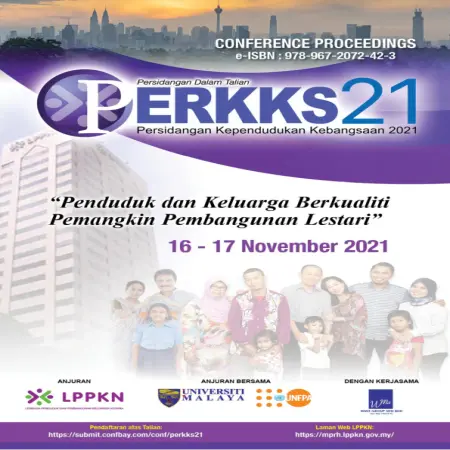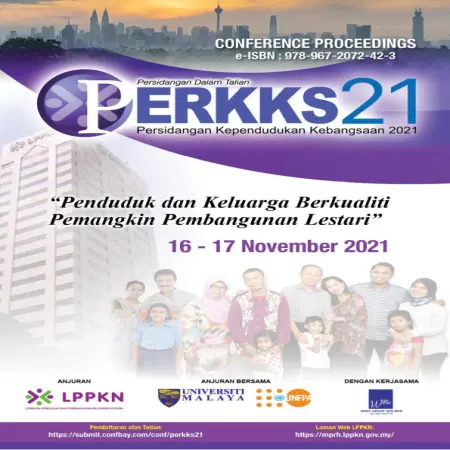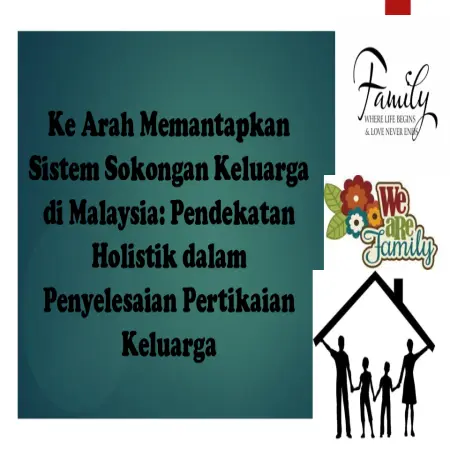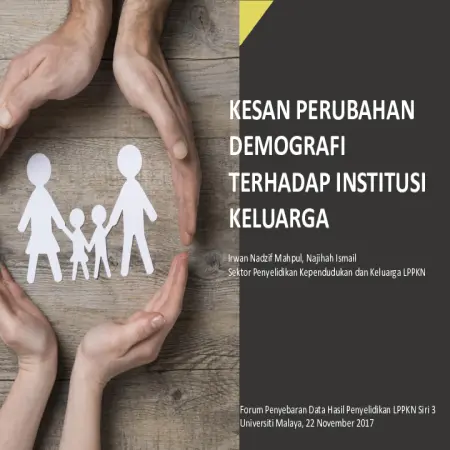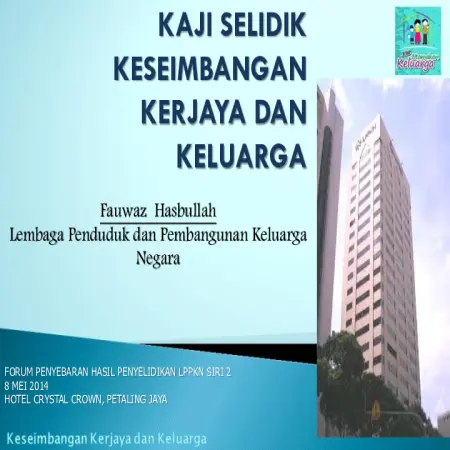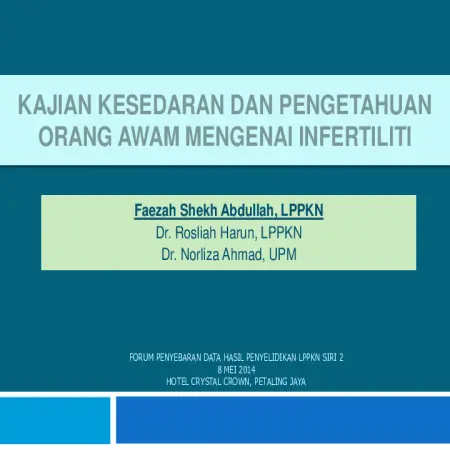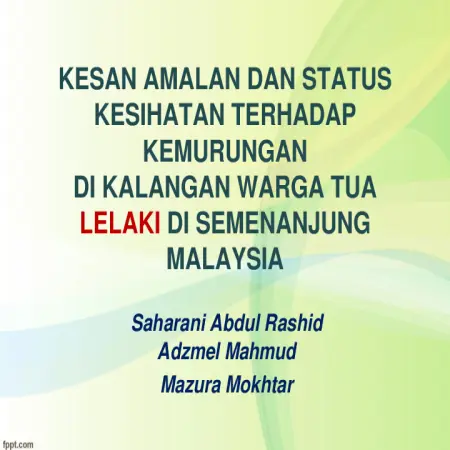Browse by Subject
Results for Search : "300 Social sciences"
|
|
Kemiskinan haid: krisis kesihatan awam yang perlu diakhiri
Item Type: Article
Editor:
Year: 00/12/2021
Abstract: Menstrual poverty is a situation when individual face difficulties in obtaining sanitary napkins (pads) or tampons due to financial constraints. It also refers to the lack or absence of sanitation facilities for managing menstruation such as no water supply or no proper waste disposal (sanitary pad) and no privacy to manage menstruation. In addition, lack of knowledge about menstruation and its management is another component of ‘menstrual poverty’. Awareness about ‘menstrual poverty’ needs to be created among the community and other stakeholders such as authorities associated with family and community institutions as well as volunteer organizations. Affected individuals also need to be empowered to speak out about the issues they face. With the pooling of resources and action from all stakeholders, this issue of ‘menstrual poverty’ can be addressed.
|
|
|
|
|
|
Kajian masa depan mengenai matlamat kependudukan 70 juta dan hubungannya dengan pembangunan umat digital di Malaysia
Item Type: Book Section
Editor:
Year: 00/00/2021
Abstract: This paper highlights the discussion of future studies on the population goal of 70 million people and its relationship with the development of the digital community in Malaysia. The total population of Malaysia is still small which is 32.75 million in the first quarter of 2021 with an area of 334,000 square kilometers. The rationale for achieving the population goal of 70 million is to provide a base of demand and market for the products of local industries in addition to receiving many greater benefits and preparing Muslims towards mastering technology.
|
|
|
|
|
|
Keluarga dan cabaran norma baharu
Item Type: Book Section
Editor:
Year: 00/00/2021
Abstract: This paper describes the current situation in family institutions during the pre-pandemic period of Covid-19 by also showing the pattern of family well-being in the country through the Malaysian Family Well-being Index (FWI), a special measurement that has been introduced by the National Population and Family Development Board (NPFDB) since 2011. Although there was an increase in scores in the third series of FWI in 2019, the situation in family institutions seemed to change with the start of the outbreak of the Covid-19 in the country at the beginning of 2020.
|
|
|
|
|
|
Ke arah memantapkan sistem sokongan keluarga di Malaysia: pendekatan holistik dalam penyelesaian pertikaian keluarga
Item Type: Conference or Workshop Item
Editor:
Year: 00/00/2017
Abstract: This topic gives an overview of the institutions that are dealing with family disputes in Malaysia. Generally, these institutions can be divided into judicial institutions and non-judicial institutions. Judicial institutions refer to the civil courts and Syariah courts. While non-judicial institutions refer to the other bodies that provide family services, including the Ministry of Women, Family and Community Development, LPPKN, Legal Aid Department, Malaysian Mediation Centre, religious institutions, private counsellors and NGOs. However, one of the downsides in the present system is lack of cooperation between judicial and non-judicial institutions that are dealing with family matters. In the meantime, resolution of legal disputes does not necessarily indicate that the disputes have been treated from the root. In order to promote holistic resolution of family disputes, family members need to be given further treatment outside of the courts, to tackle other non-legal issues, such as emotional and mental conflicts. The family support system can facilitate the individuals, particularly by giving social support and counselling. In fact, the family support institutions are able to deal with family conflicts at the early stage, thus reducing the number of cases that need to go for court trial. Family service centres that have been established in other countries such as Singapore and Australia indicated a high success rate in the resolution of family disputes. It is viewed that a cooperation between judicial and non-judicial institutions can provide a holistic approach to the resolution of family disputes. Therefore, it is suggested that a strong networking to be established between these institutions, so as to improve the referral function between them. At the same time, it is important to create awareness among the society regarding family services that are available and how these services can help them in handling their family disputes.
|
|
|
|
|
|
Kesan perubahan demografi terhadap institusi keluarga
Item Type: Conference or Workshop Item
Editor:
Year: 00/00/2017
Abstract: Since the 1980s, the fertility rate (TFR) has declined slowly from 4.0 to 2.0 children per woman in 2016. This means that every woman in the country at this point , on average, gives birth to 2 children in her lifetime. The rapid decline in fertility rate (TFR) has accelerated the aging process of the country. The TFR is likely to remain between 1.9 and 2.0 by 2020 and below 1.9 in the next decade. This presentation is about the impact of demographic change on family institutions.
|
|
|
|
|
|
Kajian Penduduk dan Keluarga Malaysia Kelima (KPKM-5)
Item Type: Video
Editor:
Year: 00/00/2014
Abstract: Announcement of the implementation of the Malaysian Population and Family Survey 2014 (MPFS-5).The purpose of this survey was to collect the latest information and time series data in respect of demography, family and reproductive health of the Malaysian population.
|
|
|
|
|
|
Kajian keseimbangan kerjaya dan keluarga
Item Type: Conference or Workshop Item
Editor:
Year: 00/00/2014
Abstract: The main objective of this study is to investigate the time arrangement between career and family among working peoples. This study leads to identifying the trend of work and family life balance in today’s families. As the result of this study, average time spent by respondent on working hour is 9 hours and 36 minutes per day, 48 hours 3 minutes per week. That duration is approach the result of the International Labor Organization ( ILO ) in 2000 which is Malaysia was ranked the longest spend time for working after South Korea. The findings also obtained the annual leave by respondent was high (26 days per year) compared to some other countries in the world . The duration of travels time to work is not much different in urban areas where respondents took 46 minutes commuting to work and the respondent metro-urban was takes about 55 minutes. This phenomena was influence the time management in their family life daily. The average time of sleep duration about 6 hours 41 minutes. Which is respondent went to sleep at 11:07 pm and wake up at 5:43 am by average. An important aspect of work-life balance is the amount of time a person spends at work. Overall in average in OECD Country, men spend more hours in paid work and the percentage of male employees working very long hours across OECD countries is 12%, compared with less than 5% for women. Finding a suitable balance between work and life balance is a challenge for all employee, especially working parents. The amount and quality of leisure time is important for people’s overall well-being, and can bring additional physical and mental health benefits. A full-time worker in the OECD works 1765 hours a year and devotes 62% of the day on average or close to 15 hours, to personal care (eating, sleeping and others) and leisure (socialising with friends and family, hobbies, games, computer and television use and others).
|
|
|
|
|
|
Kajian kesedaran dan pengetahuan orang awam mengenai infertiliti
Item Type: Conference or Workshop Item
Editor:
Year: 00/00/2014
Abstract: The infertility rate in Malaysia is estimated around 10 to 15 %. World Health Organization has classified infertility as a disease that needs attention as early as possible. It is one of the factors that contribute to decreasing total fertility rate. Public misunderstanding regarding infertility may affect on how they handle this issue. People always take this issue lightly since it is not a life-threatening disease, unlike heart attack, diabetes and cancer. The Bertarelli Foundation Scientific Board (1999) had found that infertility awareness was still low in a few countries in Europe, such as Belgium, Italy, France, Germany, Sweden and United Kingdom. Knowledge on infertility is very crucial because it helps couples to prepare when they are having difficulty in conceiving. The objective of this study was to identify our local people awareness and knowledge on infertility issues as very few studies have been done in Malaysia.
|
|
|
|
|
|
Kesan amalan dan status kesihatan terhadap kemurungan di kalangan warga tua lelaki di Semenanjung Malaysia
Item Type: Conference or Workshop Item
Editor:
Year: 00/00/2012
Abstract: This study aims to look at the factors of practice and health status that contribute to depression among elderly men aged 60 years and above in Peninsular Malaysia. The data used in this study was obtained from the 4th Malaysian Population and Family Survey which was conducted by the National Population and Family Development Board (LPPKN). The data obtained were analyzed using Descriptive Statistics and Logistic Regression. Among the variables used were the level of health, frequency of treatment, disease, frequency of exercise and health check-ups. The results of the analysis showed that coronary heart disease, decreased labor capacity, restless inability to sleep and attending religious ceremonies were independent variables influencing the risk of depression.
|
|
|
|






